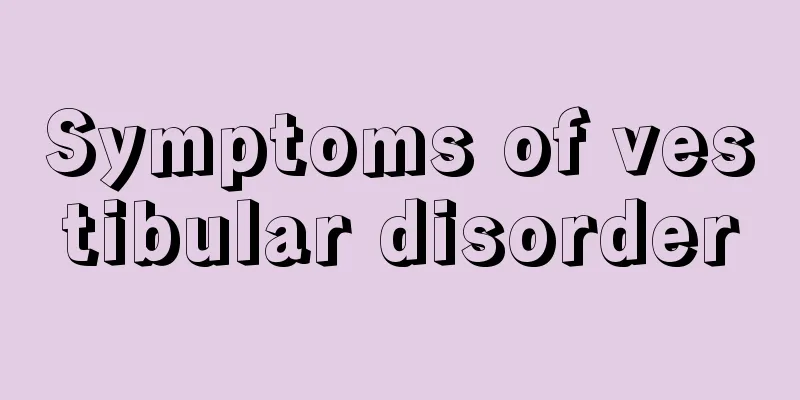Symptoms of vestibular disorder

|
Most people don't have a special understanding of vestibular nerve disorders. The human body mainly relies on proprioception, vision, and vestibular sensation to sense the body's position, movement, and external stimuli. This information is processed comprehensively to maintain the body in a more appropriate position in space. Therefore, the vestibule is an important peripheral sensory organ for maintaining human balance. If a disorder occurs, it will lead to a variety of symptoms. Let us learn about this aspect. Symptoms of vestibular disorder 1. Motion illusion vertigo Rotational vertigo, linear vertigo or displacement vertigo: In acute attacks, sudden vertigo is the main symptom, which is true vertigo. The patient feels that external objects are moving or he or she is moving, accompanied by nausea, vomiting, and diarrhea. Some patients experience chest tightness, sweating, yawning, increased heart rate, and high blood pressure. 2.Imbalance and imbalance It manifests as posture and gait balance disorders. Patients may lean to one side or feel unstable when standing or walking, and may stagger or feel drunk when walking. 3. Dizziness and lightheadedness Patients are often unable to clearly express their discomfort, such as dizziness, heaviness, numbness in the head, a feeling of emptiness, a tightness in the head, a heavy and oppressive feeling in the head, black spots in front of the eyes, etc. It may also be accompanied by symptoms of the primary disease, such as deafness, tinnitus, etc. Causes Vestibular dysfunction refers to the imbalance of vestibular function, including vestibular dysfunction or loss and vestibular hyperactivity, etc. Vestibular dysfunction can be common in the following diseases: 1. Vestibular peripheral vertigo (1) Cochlear vestibular diseases include: ① Intralabyrinthine diseases such as sudden deafness and Meniere's disease; ② Extralabyrinthine and extralabyrinthine diseases such as aminoglycoside ototoxicity. (2) Vestibular diseases include: ① intra-labyrinthine diseases, such as benign paroxysmal positional vertigo and motion sickness; ② extra-labyrinthine diseases, such as vestibular neuronitis. 2. Vestibular vertigo Includes: ① Vascular; ② Tumors, trauma, and degenerative diseases. The causes include: viral infection, inner ear circulation disorder, autoimmune disease, trauma, tumor, ototoxic drugs, congenital factors, etc. However, vestibular dysfunction is not necessarily an organic disease. It may even include excessive sensitivity of the vestibular organs and excessive stimulation of the vestibule of the inner ear, resulting in vertigo and dizziness. The most common one is motion sickness, which has certain genetic factors. In addition, emotional tension, anxiety, lack of sleep or smelling bad odors can also be triggering factors. |
<<: What's wrong with the neuralgia on half of my face
>>: Can wearing high heels make your calves thinner?
Recommend
The correct way to put your tongue against the palate
Although pressing the tongue against the upper pa...
What causes bone cancer
The occurrence of bone cancer is related to genet...
Symptoms of fundus vasospasm
Although eye health does not cause much pain to p...
How to fix the problem of steamed buns not rising
We all know that steamed buns are made by steamin...
Where to apply moxibustion for leg pain
Moxibustion is a type of traditional Chinese medi...
What is the reason for red and yellow urine
The human body is a unified system. If there is a...
What are the main factors causing colon cancer?
Colon cancer is a common disease in life. Most pe...
What does low progesterone and high hcg mean
After a woman becomes pregnant, she needs to unde...
Is it harmful if hcg doubles and progesterone is low?
Is there any harm if hcg doubles and progesterone...
Can vinegar be used externally to reduce inflammation?
Vinegar is a common condiment in our lives. It ha...
How to freshen breath?
I believe that many people have encountered the s...
Should I eat lunch first or take a nap first
Most people like to take a nap after lunch, but f...
How to practice deep breathing?
Nowadays, people are under increasing pressure in...
What are the precautions for liver cancer diet? What can liver cancer patients eat to improve their condition?
Liver cancer is highly malignant and progresses r...
What is the function of human gallbladder
I believe everyone is familiar with the substance...









